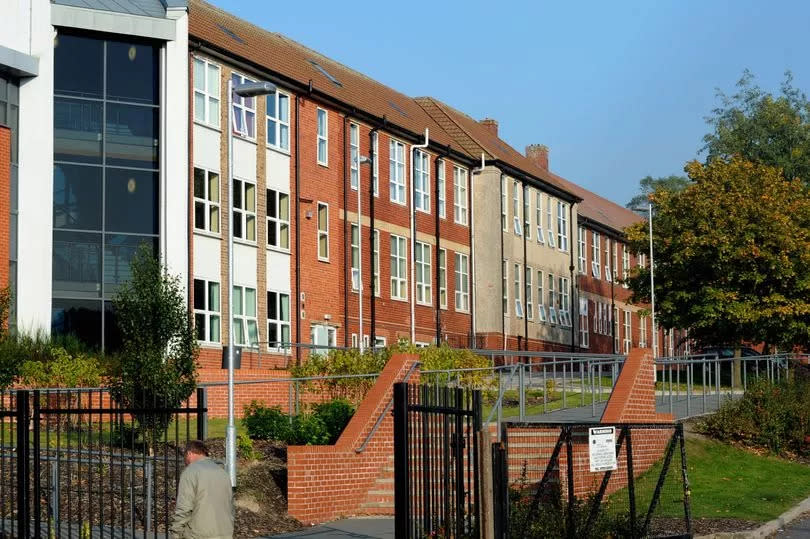North Staffordshire school still in 'special measures' despite work to cut 'severe' absence

An Ofsted inspector says a North Staffordshire school remains in special measures despite student attendance now being "significantly above the national average" and incidents of bad behaviour continuing to fall.
Leek High School was rated 'inadequate' following an inspection by the education watchdog back in March 2022. Since then the Springfield Road school has been the subject of four separate monitoring inspections, with the most recent visit taking place in February.
Although Ofsted monitoring visits are not designed to give the school an overall grade, their purpose is to identify and report on the progress being made. The latest inspection found that progress was being made but ruled that "more work is necessary for the school to be no longer judged as requiring special measures".
A recently-published letter to the school, sent by inspector Claire Price, said that although "work is starting to have an impact" it was found that the "delivery of the curriculum is still inconsistent". The inspector wrote: "Since the last monitoring visit, the IEB, the trust and trust leaders have started to work together more effectively to support the school. This has resulted in all parties having a clear understanding of how well the school is doing and where additional support is needed.
READ MORE: Ofsted allows 'inadequate' North Staffordshire school to have brand-new teachers The school was rated 'inadequate' back in 2022
READ MORE: Ofsted slates 'inadequate' North Staffordshire high school Leek High School has a 'high number' of suspensions and exclusions
"As a result, the trust has supported you well in making rapid improvements to the support provided for pupils with special educational needs and/or disabilities (SEND) and for those at the earliest stages of reading. The trust is now providing support and capacity to the school to make the improvements needed to the curriculum.
"Since my previous visit, you have set about making significant improvements to the quality of education in your school. In nearly all subjects, the curriculum is now well sequenced, and teachers know what to teach and when. You have identified that a few subjects are not yet sufficiently planned to meet ambitious end points.
"You are giving the teams leading these subjects enhanced support. This work is starting to have an impact. You know there is some further work needed to refine and review the curriculum, and this now forms part of your school review processes. Delivery of the curriculum is still inconsistent.
"You know this and have a ‘rapid improvement plan’ in place to address it. In some subjects, the choice of teaching methods and resources does not support pupils’ learning of the intended curriculum as well as it should. This limits pupils’ ability to do well. In those subjects that have clearly identified component knowledge, assessment is well-focused.
"Most teachers check for understanding and address misconceptions before moving learning on. Support for pupils with SEND has much improved. The school has updated the information that staff receive about pupils with SEND. Staff have received training in how to support pupils with SEND, and there is a thorough training plan in place to make sure that all staff have the skills and expertise to support pupils’ needs well."
The report continues: "Teachers are now using some strategies to support pupils with SEND more effectively. However, sometimes, the strategies and resources that teachers use are not suitable, and this hampers the progress that pupils with SEND are able to make. Pupils at the earliest stages of reading are now being systematically taught to read.
"The gaps in pupils’ reading knowledge are precisely identified, and interventions are delivered well by skilful staff. As a result, pupils who experience difficulty in reading are now catching up quickly. You have maintained your focus on improving pupils’ behaviour. Behaviour in most lessons and around the school is calm and purposeful. Suspensions and referrals to the school’s internal exclusion room remain much lower than in the past.
"Weekly pastoral meetings use behaviour data intelligently to put in place proactive support for pupils who are beginning to struggle. As a result, the number of behaviour incidents continues to fall. Pupils’ attendance continues to improve. It is now significantly above the national average. You work closely with pupils and families to help remove the barriers to good attendance.
"This work has greatly reduced the number of pupils who are severely or persistently absent. You continue to benefit from the external support you receive. This has helped to add capacity to your team and provide appropriate challenge to ensure that you continue to improve the school."
NEWSLETTER: Sign up for email alerts direct to your inbox

 Yahoo News
Yahoo News 
